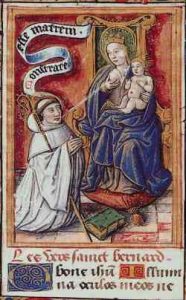
Reima Välimäki is a Postdoctoral Researcher at TIAS and the Department of Cultural History, as well as an Adjunct Professor of Medieval History
When writing this, my child is having a cold. Again. Once again, cancelled meetings. Again, a time reserved for concentrated reading and data collection is interrupted by wiping a runny nose and pleas to put Peppa Pig on. Peppa Pig (incarnated as a balloon) was also floating behind the back of my colleague while we had a Zoom meeting. He wisely pointed out that we have a certain disadvantage compared to the medieval intellectuals we study. Peppa hardly broke Bernard of Clairvaux’s contemplation – but of course, Bernard had chosen what we hadn’t: a life in celibacy.

Bernard of Clairvaux, who was not interrupted by Peppa Pig. However, in 1146 he saw a vision of lactating Virgin Mary, but that is another story.
The first comparison that occurs to most researchers with family is not, however, cloistered medieval men but our colleagues without children. In the horrible Academic September in Finland (our very special purgatory with the start of the semester and major funding calls overlapping) such a comparison becomes acute and frustrating. How are we to compete with colleagues conversing with Kant while our heads are filled with the opening tune of Caillou? How is one supposed to produce a paradigm shift when sometimes it is a challenge to shift all the puzzles and children’s books that have invaded one’s desk? The “career breaks” line in the academic CV does not quite cover all the everyday interruptions that come with the package.
Yet, I still manage to believe that children can enrich also our research in addition to the obvious enrichment of our personal lives. At least in the humanities, where the focus is the wonderfully messy human condition. In the past decades, the array of subjects covered by academic history has expanded immensely: workers, women, family, children, minorities, everyday life, sexuality, disability, to name but a few. Behind this development are not only paradigm shifts but the increased diversity of academic historians.
While personal experience does not guide our research methods, it very much affects what we pay attention to in the first place. I noticed this when re-reading the Stettin inquisition protocols from 1392-1394, a group of documents I’ve been used in various studies since my MA thesis. However, only after becoming a father myself, I spotted this piece of information: (I have written about it before in Finnish)
In her interrogation, a 24-year-old woman Grete Joris told that both she and her husband Mathias had been summoned by the inquisitor. Mathias had been unable to answer the summons because after walking a mile, he had had to turn back home carrying their son. Probably it was a small child getting tired – or a father realising that he cannot carry the child for the whole journey, dozens of miles. A very human moment, and familiar to anyone trying to walk with a toddler. And one I only paid attention to after struggling with my own kid.
So while taking care of our children – or elderly relatives – inevitably occupies our research time, we can perhaps cherish the thought that those frustrating moments make us more aware of the fragility, imperfectness, exhaustion, and support given and needed that are an essential part of humanity past and present.
I am yet to discover how to frame that in a grant application.
